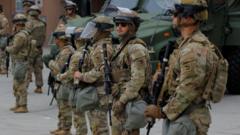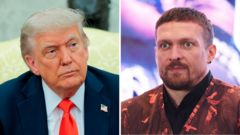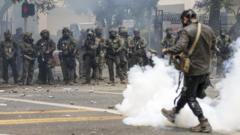Amid peaceful protests in Los Angeles regarding immigration policies, President Trump's quick deployment of National Guard troops has ignited a debate over law enforcement and civil liberties.
Trump's Militarized Response to LA Protests Sparks Controversy

Trump's Militarized Response to LA Protests Sparks Controversy
President's swift action to deploy National Guard raises alarm over escalating tensions
In the wake of protests against Immigration and Customs Enforcement (ICE) actions in Los Angeles, President Donald Trump seized the opportunity to reinforce his tough stance on lawlessness, a central aspect of his campaign rhetoric. While the Los Angeles Police Department (LAPD) reported that the demonstrations were generally peaceful, the administration portrayed a different narrative, claiming that immigration agents faced threats and insufficient local support.
"We cannot wait hours for LAPD to respond during violent protests," stated Homeland Security Secretary Kirsty Noem during an interview, emphasizing the necessity for immediate action. Following her comments, Trump federalized 2,000 members of the California National Guard, despite pushback from Governor Gavin Newsom, and hinted at the possibility of deploying U.S. Marines prepared for mobilization.
By Sunday morning, Trump was quick to declare a return to normalcy, crediting the National Guard for restoring order, even as many of them had yet to arrive on scene. This rapid response reflects the administration’s belief that strong law enforcement and immigration control are crucial political assets, potentially appealing to both his dedicated supporters and conservative-leaning independents.
Noem emphasized the lessons learned from the Black Lives Matter protests in 2020, asserting the new administration vowed to ensure no similar unrest would occur under their watch. Critics like New Jersey Senator Cory Booker argued that such heavy-handed tactics were incendiary and counterproductive, warning that they threaten to escalate tensions further.
The situation in California could either signal a broader pattern of unrest or remain a singular incident as the country experiences its annual summer protest season. With just five months into his second term, Trump's aggressive immigration approach and militarized response may play a significant role in shaping both public opinion and future demonstrations across the nation.
"We cannot wait hours for LAPD to respond during violent protests," stated Homeland Security Secretary Kirsty Noem during an interview, emphasizing the necessity for immediate action. Following her comments, Trump federalized 2,000 members of the California National Guard, despite pushback from Governor Gavin Newsom, and hinted at the possibility of deploying U.S. Marines prepared for mobilization.
By Sunday morning, Trump was quick to declare a return to normalcy, crediting the National Guard for restoring order, even as many of them had yet to arrive on scene. This rapid response reflects the administration’s belief that strong law enforcement and immigration control are crucial political assets, potentially appealing to both his dedicated supporters and conservative-leaning independents.
Noem emphasized the lessons learned from the Black Lives Matter protests in 2020, asserting the new administration vowed to ensure no similar unrest would occur under their watch. Critics like New Jersey Senator Cory Booker argued that such heavy-handed tactics were incendiary and counterproductive, warning that they threaten to escalate tensions further.
The situation in California could either signal a broader pattern of unrest or remain a singular incident as the country experiences its annual summer protest season. With just five months into his second term, Trump's aggressive immigration approach and militarized response may play a significant role in shaping both public opinion and future demonstrations across the nation.
















